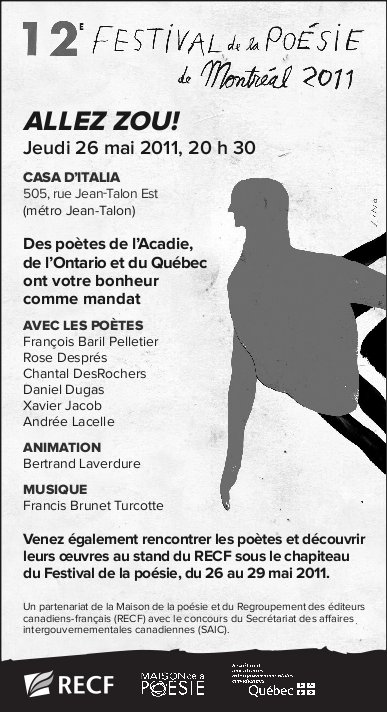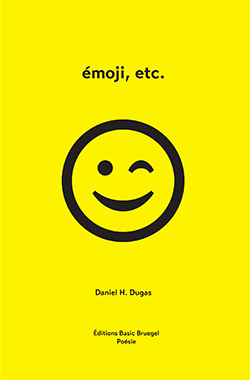Belle Soirée Martin-Pître (2011)
Le Festival acadien de poésie a eu lieu entre deux systèmes de basse pression. Entre ces deux appuis-livres météorologiques, il y a eu quelques jours de soleil, en fait assez de lumière pour illuminer les poètes qui n’en demandaient pas mieux. C’était ma troisième participation au Festival et ma première en tant que directeur artistique de la Belle Soirée Martin-Pître où je participais aussi à titre de poète. Cette double occupation a eu un effet d’accélération et d’intensification d’expériences, bref l’adrénaline coulait à flot !
L’élaboration de la Soirée s’est faite en complicité avec les poètes : Joséphine Bacon, Jacques Proper Bazié, Francis Catalano, Christine Germain, Georgette LeBlanc et Stanley Péan, mais aussi avec Sébastien Michaud et son ensemble (Mike Melanson et Mike Maillet). Le projet n’aurait pu se concrétiser sans le soutien énergétique de mon ami poète Jonathan Roy et le savoir-faire de Jérôme-Luc Paulin à la manipulation vidéo.
Un spectacle existe pour être vu et entendu, c’est un acte de partage avec un public. Je crois que nous avons tous ensemble créé quelque chose de fantastique et de magique, quelque chose qui flotte – sûrement, sans doute, encore – avec les aurores boréales et australes du monde entier !
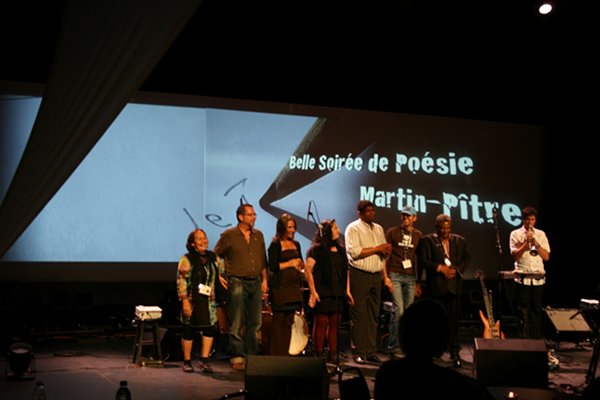
de gauche à droite : Joséphine Bacon, Francis Catalano, Georgette LeBlanc, Christine Germain, Stanley Péan, Daniel Dugas, Jacques Proper Bazié et Sébastien Michaud
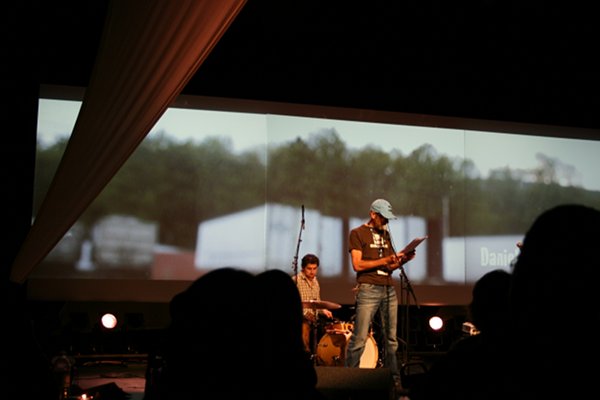
Daniel Dugas
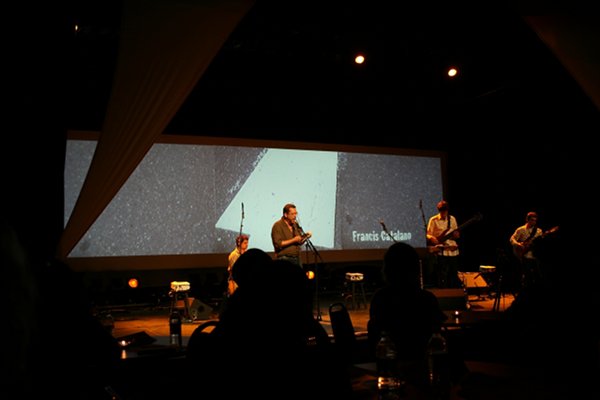
Francis Catalano
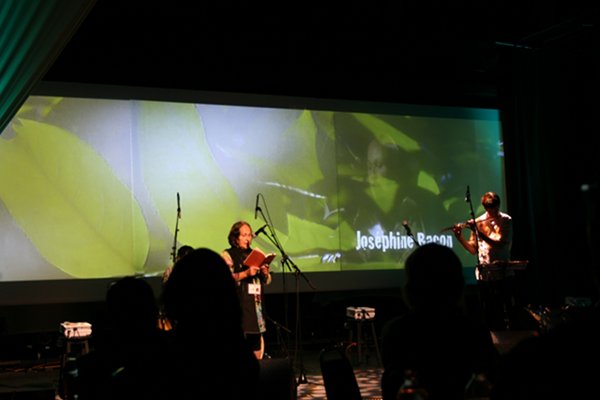
Joséphine Bacon
Caraquet: le festival de poésie est bien enraciné
Après 15 ans d’existence, l’événement ne cesse de prendre de l’ampleur
par Julie-Anne O'neil L'Acadie Nouvelle 8 août, 2011
par Julie-Anne O’neil
CARAQUET – Après 15 ans d’existence, le Festival acadien de poésie peut affirmer être toujours bien vivant, puisqu’il ne cesse de prendre de l’ampleur à chaque édition. À la clôture des festivités, les organisateurs sont donc en mesure de dire qu’encore une fois, l’événement a été couronné de succès.
Pour cette 15e édition, 15 auteurs et poètes ont été invités à présenter pendant quatre jours leur passion des mots au public.
Ces derniers viennent s’ajouter aux 160 autres poètes et auteurs qui ont déjà pris part à l’événement depuis les touts débuts.
D’ailleurs, dans la programmation de vendredi figurait la Belle soirée de poésie Martin-Pître où l’on a souligné d’une façon bien spéciale les 15 ans du Festival acadien de poésie. Les auteurs invités cette année ont fait la lecture d’extraits des auteurs et poètes qui ont participé à l’événement au cours des 15 années.
Claude Le Bouthillier, écrivain acadien de Bas-Caraquet, affirme avoir adoré cette soirée en grande partie pour les huit minutes accordées à la présentation d’extraits des œuvres littéraires d’anciens participants. D’ailleurs, l’auteur qui a participé à maintes reprises à l’événement, notamment à cette édition-ci, a suggéré à la coordinatrice du festival de refaire cette activité tous les ans.
Chaque édition, tant les auteurs que les gens du public apprécient grandement la qualité de l’événement.
«On se fait souvent complimenter pour la convivialité du festival, pour l’accueil, mais aussi pour les lectures», explique Jonathan Roy, assistant à la coordination.
Au fils des ans, l’événement prend toujours de plus en plus d’ampleur, faisant découvrir au public des auteurs acadiens, mais également de divers horizons de la francophonie.
«On a toujours une place privilégiée pour nos auteurs acadiens, mais notre ouverture sur la francophonie nous permet d’accueillir des gens d’ailleurs», note Violette Lanteigne, coordinatrice de l’évènement.
Cette année de la poésie du Burkina Faso, d’Haïti, et innue était à la programmation.
C’est cette ouverture sur la poésie internationale qui, selon Jonathan Roy, fait évoluer le festival.
«C’est bien de toujours mettre de l’avant nos auteurs acadiens, mais inviter les autres permet aux gens d’ici de s’ouvrir à d’autres types de poésie», note l’assistant à la coordination.
Il poursuit en affirmant notamment que cette ouverture permet la rencontre entre auteurs, qui mène souvent vers des collaborations entre eux.
L’équipe du Festival acadien de poésie a relevé une grande participation du public pour cette 15e année du festival.
Au dire de Violette Lanteigne, l’assistance était plus considérable que les années précédentes. Quant à Jonathan Roy, il affirme que des gens suivent la programmation chaque année.
«C’est la preuve qu’après 15 ans à s’acharner à maintenir le festival, les gens développent un intérêt», poursuit-il.
Bien que le Festival de poésie ne s’est terminé qu’hier, Violette Lanteigne affirme que déjà, ils commencent à brasser des idées pour la prochaine édition.
Spider VS Fly (2011)
Alors que je ramassais des pois dans le jardin, j’ai entendu un étrange bruissement. On aurait dit une abeille qui battait des ailes. J’ai regardé dans les lupins en écartant les tiges mortes des plantes. Là, sous les feuilles j’ai découvert une mouche recroquevillée, engluée dans la toile d’une araignée. Il y avait tout autour d’autres malheureux immobiles, prisonniers. L’acarien translucide, comme un picador en furie, enfonçait ses piques empoisonnés dans le corps affaibli de la victime. Devant moi, dans ce jardin à l’apparence tranquille, avait lieu une effroyable mise à mort.

Tablets – Tablettes (2011)
Journée de tournage avec Jean-Denis Boudreau, Katie Hunter et Charlie Hunter sur les rives de la baie de Shepody. Le vidéo se veut un clin d’oeil aux propriétés magiques de la technologie. Voici quelques images des acteurs ! Les costumes sont de Valerie LeBlanc – in progress
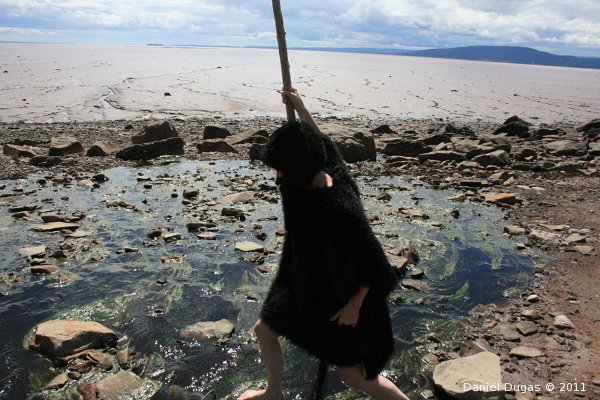
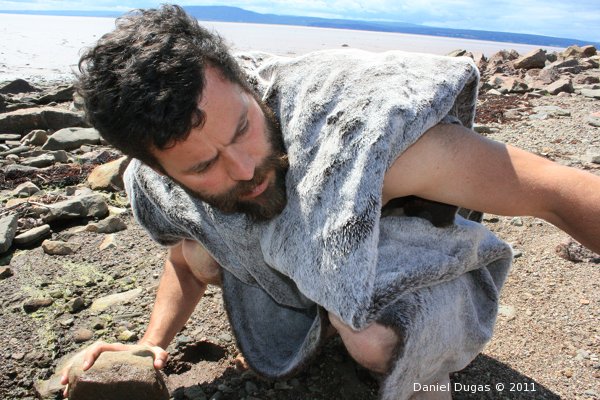
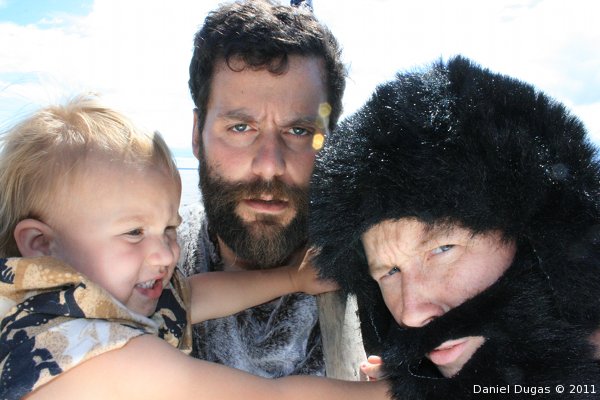
Booklet for What We Take With Us (2011)
Valerie LeBlanc and I are working on a documentation booklet for What We Take With Us. The video installation will be shown at The New Gallery in Calgary in January 5 – February 4th 2012! Here is a screenshot.
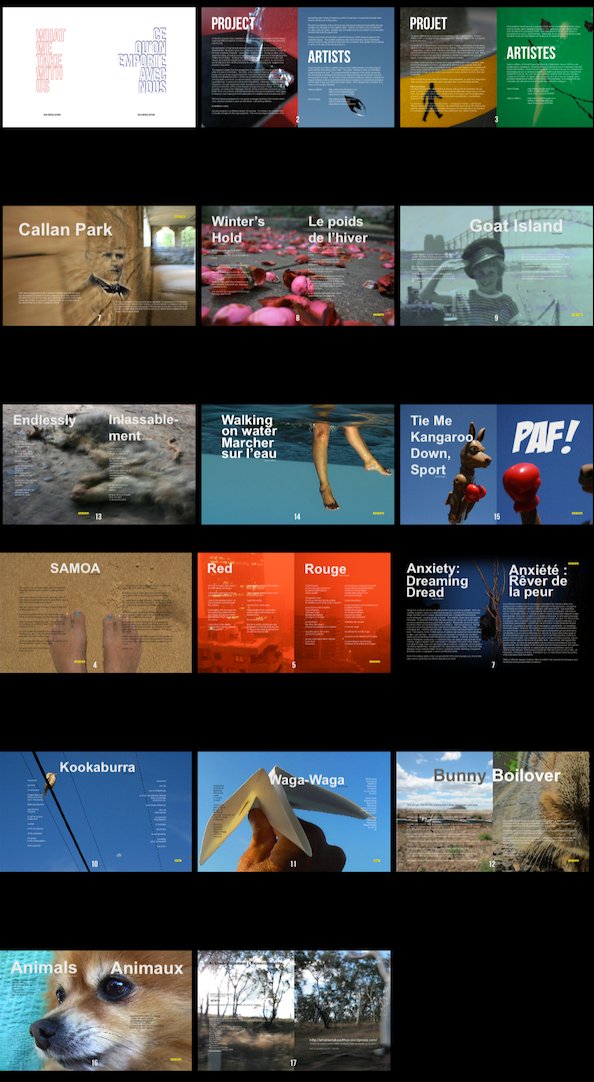
OIL – Beneath the Surface (2011)
OIL is a program of short videos exploring issues and relationships we have with oil, both politically and poetically. I am very happy and extremely proud of the program, the works are excellent and thought provoking. This project would not have happened without the generosity of all the artists involved, and all of the work by Vicki Chau and EMMEDIA. I would like to thank everyone for his/her willingness to be part in this!
The screening is tonight TUESDAY, JULY 12, 2011 @ 7PM at EMMEDIA:
#203, 351 – 11 Ave. SW Calgary, Alberta T2R 0C7
Link to download Program Brochure with Daniel Duga’s Curatorial Statement and Artist Biographies
Videos in the program in screening order:
“Oil (Excerpt)” by Peter Aerschmann (Bern, Switzerland)
“OIL’D” by Chris Harmon (Brooklyn, NY)
“BASIN” by David Geiss (Victoria, BC)
“SCAPE” by Kyle Armstrong & Leslea Kroll (Edmonton, AB)
“A Flood and then some Desert” by Kent Tate (Shaunavon, SK)
“Paper Moon, Cardboard Sea” by Valerie LeBlanc (Moncton, NB)
“Tar Sand Pudding” by Xstine Cook (Calgary, AB)
“Lux Aeterna” by Jacopo Jenna (Firenze, Italy)
“Palabras Negras (black words)” by Anthony Gasca (Montreal, QC)
“OILSPILL – The Human Ueberfluss (Trailer)” by Andy Fox & Jo Blankenburg (Salzburg, Austria)
“OIL” by Maayke Schurer (Kingston, ON)
“Petrolena” by Mark Olin (Titusville, PA)
ALLEZ ZOU ! (2011)
ALLEZ ZOU !
Des poètes de l’Acadie, de l’Ontario et du Québec ont votre bonheur comme mandat
Ce que nous voulons d’abord c’est vous amuser, vous attendrir, vous donnez le meilleur de tous les poètes convoqués. Les interventions seront courtes et vives. Notre idée c’est d’aller vite, sans brusquer les poèmes, sans nuire à la charge émotive qu’ils portent, en soufflant aux spectateurs la vitalité de la parole des poètes du RECF (François Baril Pelletier, Rose Després, Chantal DesRochers, Daniel Dugas, Xavier Jacob, Andrée Lacelle). Peut-être qu’il y aura des bandanas pour chacun d’eux, drapeaux discrets de leur souveraineté singulière, mais il y aura certainement des ponts musicaux, des pistes de lecture intuitives, ordonnées, calibrées, interprétées par le talentueux guitariste Francis Brunet Turcotte. Le poète Bertrand Laverdure viendra ici servir de liant, cuisinier sans émission qui sera là pour dresser la table, faire cuire le soufflé, avec tous les risques que ça comporte parce qu’il aura d’abord et avant tout votre bonheur comme mandat.
Un partenariat de la Maison de la poésie et du Regroupement des éditeurs canadiens français (RECF) avec le concours du Secrétariat des affaires intergouvernementales canadiennes (SAIC) et du ministère du Patrimoine canadien.
Direction artistique : Bertrand Laverdure Production : Le Regroupement des éditeurs canadiens- français et la Maison de la poésie de Montréal
Festivals de poésie (2011)
Après le Festival Frye, évènement extraordinaire, je m’apprête à participer à deux autres festivals de poésie. Celui de Montréal tout d’abord, qui possède peut-être la plus belle affiche de l’année, et puis le 8e Festival international et Marché de Poésie Wallonie-Bruxelles qui a lieu à Namur. À suivre…
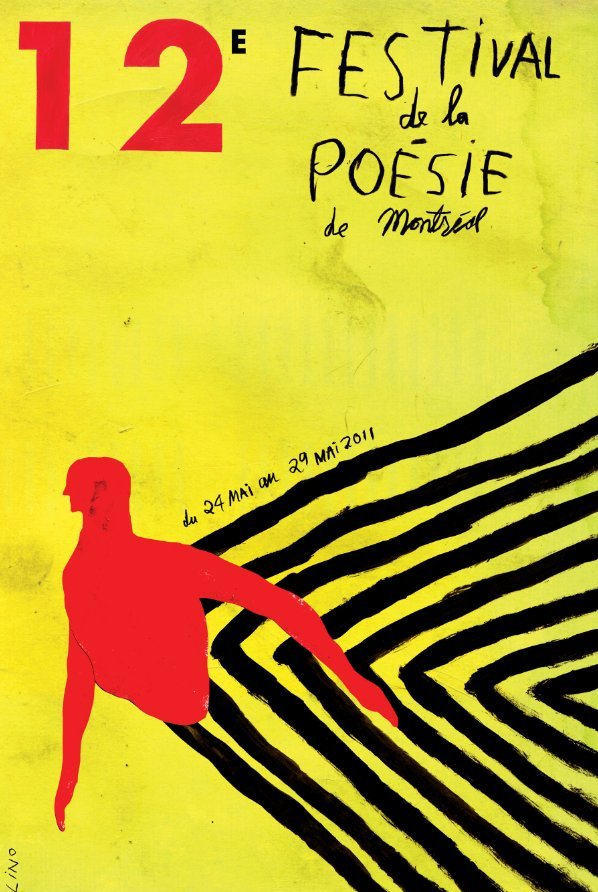 Festival de la Poésie de Montréal 2011 :
Festival de la Poésie de Montréal 2011 :
http://www.maisondelapoesie.qc.ca/
Dates : 24 mai au 29 mai 2011
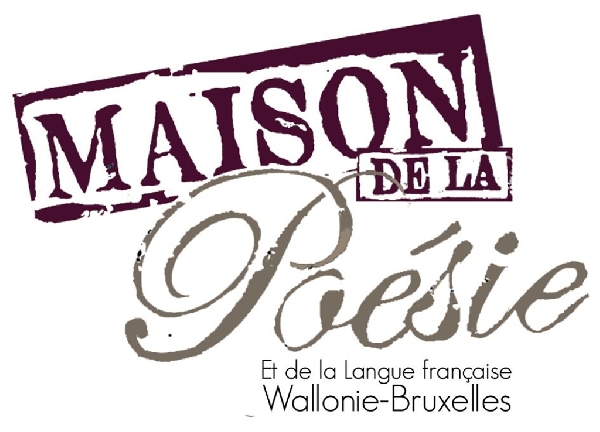
8e Festival international et Marché de Poésie Wallonie-Bruxelles
http://www.maisondelapoesie.be/agenda/evenement.php?id=715
Dates : 22 juin au 26 juin 2011
Lieu: Maison de la poésie, 28, rue Fumal 5000 Namur
Festival Frye Festival (2011)
Voici mon horaire pour le Festival :
le mercredi 27 avril à 12 h | Wednesday, April 27 at 12 PM
Les nouvelles technologies et les changements dans la pratique de la lecture
New Technology and the Changing Face of Reading
Daniel Dugas, Michael Happy, B.W. Powe, Serge Patrice Thibodeau
Moncton City Hall – Hôtel de ville de Moncton
PCQVP – PWYC
View Larger Map
le jeudi 28 avril à 22 h30 |Thursday, April 28, at 22 h 30
Night Howl –
Karen Connelly, Daniel Dugas, Musical Guest: Joe Grass
Cri nocturne – Karen Connelly, Daniel Dugas
Invité musical : Joe Grass
City Grill – - PCQVP-PWYC
le samedi 30 avril à 22 h 30 |Saturday, April 30 at 10:30 PM
Frye Jam
Hélène Dorion, Daniel Dugas, Doug Harris, Mark Anthony Jarman, Susan Juby, Dyane Léger, Shandi Mitchell
Animé par Les Païens with Joe Grass
Invités musicaux: Bernard Adamus, Phil Flowers, Viviane Roy
City Grill – $10
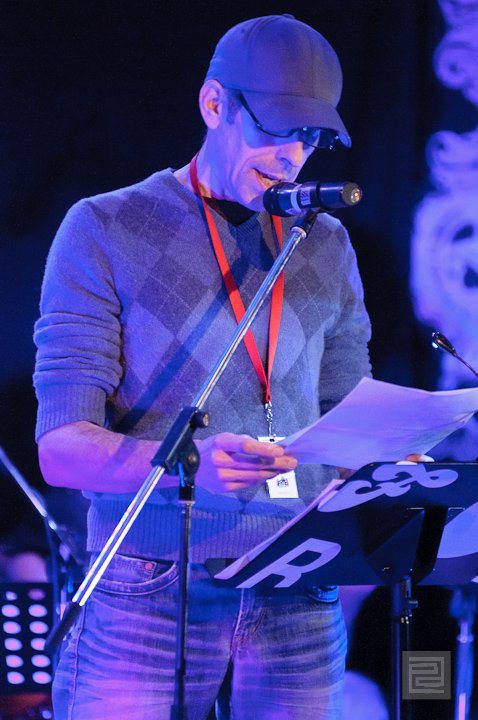
Horaire complet
Books: Frye Festival roundtable features Daniel Dugas, Michael Happy, B.W. Powe and Serge Patrice Thibodeau (2011)
by Shannon Webb-Campbell
For the Telegraph-Journal
Monday April 25th, 2011
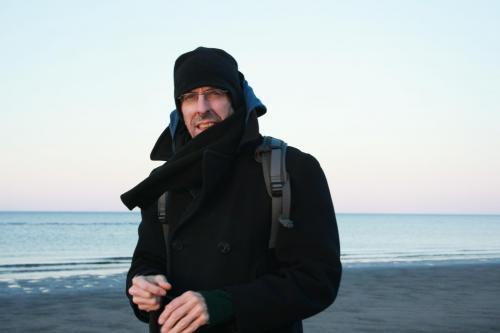
Writer Daniel Dugas says there’s a third dimension to a book that is hard to replicate in a virtual form.
Photo: Courtesy Valerie LeBlanc
Technology changes, but the written word remains the same.
Writers Daniel Dugas, Michael Happy, B.W. Powe and Serge Patrice Thibodeau host a roundtable discussion revolving around technology’s influence and effect on reading Wednesday at this year’s Frye Festival in Moncton.
“Physically we have developed a talent to read on small screens and to stare at bright lights for long periods of time,” says Dugas, a writer and new media artist. “We can even do that while walking or driving. Content is available 24-7, dressed up in all different suits at our fingertips.”
As a society we’ve become dependent on technology, addicted even. It’s most common to rely on e-readers, iPads, Kindles and reading newspapers, magazines and literature online. The advantage of technology resides in accessibility, documents are readily available that were once tucked away in libraries, research centres and universities.
“A book is a book is a book,” says Dugas. “There is a third dimension to the book that is hard to replicate in a virtual form. Our brains are good at that, feeling all of the dimensions. We have a spatial memory that enhances our reading, we take mental notes without even realizing it. Somehow we remember that a passage that we were trying to relocate in the book is on the bottom left or the top right.”
As a writer and publisher, Serge Patrice Thibodeau embraces technology yet firmly believes the bound and printed will persevere. In terms of history, the book is relatively new, being only 500 years old. At one point and time no one owned books. Every single book had to be handwritten and transcribed.
“Print will always be there. We will never abandon the book,” says Thibodeau. “When Life Magazine first started it was declared as the death of the book. People thought magazines would take the place of the book.
“The paper book will always remain, we don’t want to spend the rest of our lives in front of a computer or a screen. I think it would be too soon or fatalistic to predict the death of the book.”
Mohawk University professor Michael Happy adores books, though knows even his own reading has been influenced by technology’s shift. As a Frye scholar, he opens one of his 30-volume texts every day, though notes Google is a go-to quick reference.
“I’m a book person and I find myself like a water fly skittering from text to text,” says Happy. “It’s a big deal for me to sit down with a book, which I find I must take time to do.”
Happy believes it’s not the book that matters, it’s the literature. A culture is founded within its literature – imagination, storytelling and art. Long before the book, oral storytelling preserved culture. He says technology is altering our culture.
“The reason literature and all arts speak directly to us is the articulation of imaginative constants, the things that make us human,” he says. “These things are constant, the vernacular changes and sometimes the delivery changes, yet the human condition doesn’t change.”
Technology has changed the way we communicate. While language is fluid and continuously developing, the role of technology is changing our experience of it. Happy notices this most in the classroom.
“Our language is changing, you can see that in an awful lot of ways,” he says. “There is a vernacular, abbreviations, acronyms and all sorts of code that people speak and write to make the experience more efficient. These are very direct changes on the language. Is it a change for the worse? I don’t know.”
The Frye Festival roundtable New Technology and the Changing Face of Reading, featuring Daniel Dugas, Michael Happy, B.W. Powe and Serge Patice Thibodeau, takes place Wednesday at noon at Moncton City Hall. For information, visit www.frye.ca.
Questions & Answers
Interview with Shannon Webb-Campbell
How is technology changing the way we read?
I think it is fair to say that technology has changed the way we read and perhaps even what we read. Physically, we have developed a talent to read on small screens, to stare at bright lights for long periods of time. We can even do that while walking or driving. Content is available 24-7, dressed up in all kinds of different suits at our fingertips. We have become dependent and addicted to technology, sending shorter and shorter messages all the time.
One of the best things technology has done for reading is to have given voices to many people. I am thinking particularly of the rise of the blogs in the late 1990’s.
How are iPads, Kindles and e-readers influencing our reading? Are we reading less or are we reading more as a society?
I don’t know if we are reading more, but one thing is sure is that we are downloading a lot more. There are an enormous amount of public domain books available, on Feedbooks, Internet Archive, Amazon, the digital library Gallica, etc. E-readers make it easy to access them. The drawback in the public domain books is the number of mistakes, typos that can be found. It can be quite discouraging.
Is print dead?
This is not a new fear. In the mid-1800s when the French painter Paul Delaroche, saw his first Daguerreotype, he said that painting was dead. The power of representation of the photographic medium was scary for many painters, but we know that it was not the end. The same challenge exists now with print, but I believe that it will adapt.
Recently I interviewed Alberto Manguel, the world’s authority on the book. He says the production of the book has always been influx. Personally, he’d rather read the bound and printed (he does have a library boasting 35,000). What’s your take on the future of the book?
A book is a book is a book. There is a third dimension to the book that is hard to replicate in a virtual form. Our brains are good at that, feeling all of the dimensions. We have a spatial memory that enhances our reading when we read we take mental notes, without realizing it. Somehow we remember that a passage that we trying to relocate in the book is on the bottom left or the top right. I have a Kindle and I like it a lot, the electronic ink is just beautiful, but that does not take away from the feeling of holding a book. These are two different things and I think that is where the power of the book lies.
How does technology change our relationship to reading? What is the difference between reading something as a hard copy (in book form) versus on an e-reader?
Access to knowledge is probably the biggest advantage of technology; we can read books and documents that were inaccessible before. Depending the kind of reading, if it is exclusively e-books, that is great but when it comes time to annotate a book, I prefer to have the real thing. Keeping track of information can be challenging.
(I finished reading Manette Salomon a book from the brothers Goncourt, for a course at the Université de Moncton and I think it would have been difficult to keep track of my tabs in an e-book – see picture)
What is your opinion or prediction for the future of reading from a technological perspective?
It will accelerate and become even more pervasive.
What are the advantages to e-readers?
As stated by the marketers – portability. Read anywhere, save trees, etc.
How does technology influence and shape your own art?
I am a writer and a new media artist as well. My first encounter with a new technology (at the time when it was new) was in the mid-80’s with the MIDI protocol (Musical Instrument Digital Interface). I thought that it was fascinating and that the possibilities were endless! Basically, I have always seen technologies as enablers, as tools, and I continue to use them in that optic.
Daniel H. Dugas
Archives
Blogroll
- A.I.R. Vallauris
- ACAD
- Adobe additional services
- Adobe Creative Cloud
- AIRIE
- Amaas
- Amazon Author Central
- ARTothèque
- Australian Poetry
- Basic Bruegel
- Bitly
- CCCA
- CDBaby
- Cycling 74
- Dissolution
- Éditions Prise de parole
- Emmedia
- eyelevelgallery
- FAVA
- Festival acadien de poésie
- Festival FRYE Festival
- FILE – Electronic Language International Festival
- Freeware list
- Fringe Online
- Galerie Sans Nom
- Gotta Minute Film Festival
- Instants Vidéo
- JUiCYHEADS
- Kindle Direct Publishing
- Klondike Institute of Art and Culture
- La Maison de la poésie de Montréal
- La Maison de la Poésie et de la Langue française Wallonie-Bruxelles
- Laboratorio Arte-Alameda
- Le Centre Jacques Cartier
- Liberated Words
- Maison Internationale de la Poésie – Arthur Haulot
- MediaPackBoard
- Miami Book Fair International
- Monoskop
- Mot Dit
- NSCAD University
- Paved Arts
- PoetryFilm
- Portail des auteurs du Nouveau-Brunswick
- RECF
- Revue Ancrages
- Salon du Livre du Grand Sudbury
- Sculpture Space
- Subtropics.org
- Sydney college for the arts
- The Centre for Contemporary Canadian Art
- The New Gallery
- Trevigliopoesia
- tumbler-documents
- V Tape
- Valerie LeBlanc
- VideoBardo
- Void Network-Κενο Δίκτυο
Categories
- #covidpoèmes
- Advertisement
- AIRIE
- Ancrages
- anthology
- Anthropocene
- Architecture
- Around Osprey
- art
- Article de presse
- arts visuels
- audio
- Australian Poetry
- Basic Bruegel Editions
- Book
- book fair
- Cafe Poet Program
- Ce qu'on emporte avec nous
- Citations gratuites
- Collaboration
- commentaire
- commentary
- Compte rendu
- conférence
- Conservation Foundation of the Gulf Coast
- COVID-19
- Critique littéraire
- culture
- Daniel Dugas
- Design
- Édition Michel-Henri
- Éditions Perce-Neige
- Éloizes
- Emmedia
- emoji etc | émoji etc
- Environnement
- essai
- essay
- Everglades
- Exhibition
- festival
- Festival acadien de poésie
- Festival Frye Festival
- FIPTR
- Flow: Big Waters
- Fundy
- Habitat
- installation
- Instants Vidéo
- interactivity
- journal
- JUiCYHEADS
- Kisii
- L'Esprit du temps
- laptop
- Leaving São Paulo
- lecture
- Livre
- logos
- Magazine
- Miami Book Fair
- Moncton 24
- novel
- OASIS
- oil spill
- perception
- performance
- Photo
- poésie
- Poetic Licence Week
- Poetry
- politics
- politique
- press
- Prise de parole
- Revue Ancrages
- salon du livre
- sculpture
- Sculpture Space
- sound
- Souvenirs
- Spirit of the Time
- Style & Artifacts
- Symposium d'art/nature
- talk
- television
- The New Gallery
- Uncategorized
- Valerie LeBlanc
- vidéo
- vidéopoésie
- Videopoetr/Vidéopoésie
- videopoetry
- visual arts
- What We Take With Us
- youth literature






